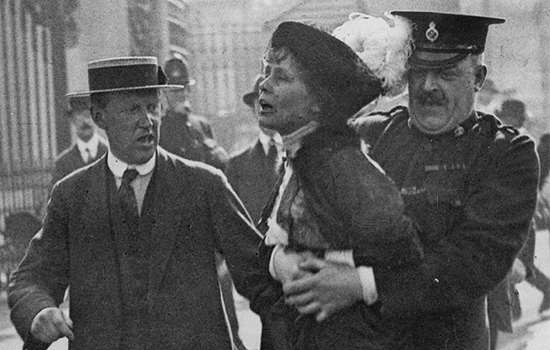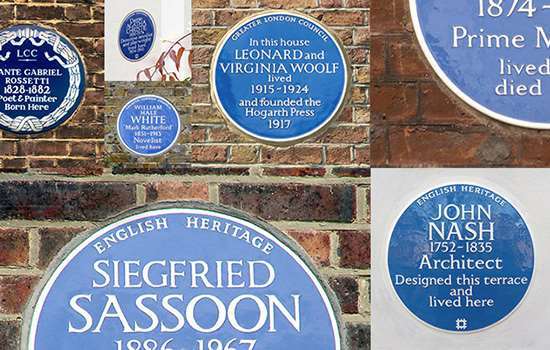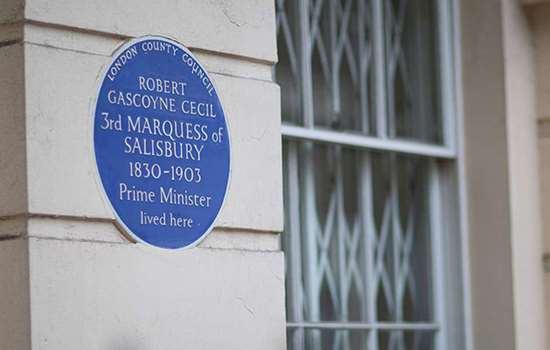MENUHIN, Yehudi (1916–1999)
Plaque erected in 2023 by English Heritage at 65 Chester Square, Westminster, London, SW1W 9DU, City of Westminster
All images © English Heritage
Profession
Musician
Category
Music and Dance
Inscription
YEHUDI MENUHIN 1916–1999 Violinist, conductor and teacher lived here
Material
Ceramic
Yehudi Menuhin was a world-famous child musical prodigy who played, composed and conducted throughout most of his long life. English Heritage has commemorated him with a blue plaque at 65 Chester Square, Westminster, where he lived during his later years.
Menuhin was born to a secular Jewish family in the Bronx, New York, in 1916. He began violin lessons at the age of five and made a series of professional débuts soon after, notably as a violin soloist with the San Francisco Symphony Orchestra in 1924.
In 1929 Menuhin made his London début with the London Symphony Orchestra, and made his first recordings for His Master’s Voice (HMV) gramophone company, with which he was to remain in close association for over half a century. In 1932 he recorded Edward Elgar’s Violin Concerto, conducted by the composer himself, to huge acclaim. His touring schedule was hectic too: in 1935–6 he performed in 73 cities around the world.
Second World War and beyond
During the war Menuhin gave hundreds of benefit concerts, including for the Red Cross, American Women’s Voluntary Services, Russian War Relief, the Free French, in munitions factories in Britain, and for American and Allied troops (often in combat zones). After the war he performed to Holocaust survivors from liberated concentration camps, including a performance at Bergen-Belsen with Benjamin Britten.
In the 1940s and 1950s, Menuhin performed and made recordings of the classical canon, although he also began to include lesser-known works. He championed modernists as well as neglected pieces. He also commissioned and performed ‘Sonata for Solo Violin’ by Béla Bartók. An especially successful venture outside traditional performance was with Indian composer and sitar player Ravi Shankar, whom he first heard during his Indian tour of 1952. (He also met yoga teacher BKS Iyengar on this same tour and became passionately devoted to the discipline.) In the 1970s, albums of duets performed with jazz violinist Stéphane Grappelli were bestsellers.
Becoming a conductor
Among many festivals and competitions, Menuhin was heavily involved in setting up the Bath Music Festival, and he created the Gstaad Saanenland Summer Music Festival in Switzerland, which still flourishes as the Gstaad Menuhin Festival. He was also joint Artistic Director of the Windsor Festival. It was at these festivals that he began to conduct regularly. Before long, many of the world’s leading orchestras had come under his baton.
Music for all
Menuhin believed that music was for everyone and that it had the power to change lives. He was dedicated to the education of young musicians, and was responsible for several educational foundations globally, including the Yehudi Menuhin School for Music, which started in London in 1963 before moving to Stoke D’Abernon in Surrey the following year.
As an impassioned humanitarian and idealist from his teenage days Menuhin used his celebrity to speak out against apartheid in South Africa, Israel’s occupation of the West Bank and the lack of political and cultural freedom in the Soviet Union.
Menuhin’s legacy
Alumni of the Yehudi Menuhin School include stars such as violinists Tasmin Little and Nigel Kennedy, cellists Colin Carr and Paul Watkins, and pianists Paul Coker, Kathryn Stott and Melvyn Tan. Menuhin founded the charity Live Music Now! (LMN) in 1977; its aims are to help with physical and mental health issues through music. The International Yehudi Menuhin Foundation continues his work to improve the environment of children through the Arts at school. The MUS-E programme promotes artistic exchanges, and encourages the expression and representation of cultural identities (especially endangered ones) in 12 countries.
In 1985 he accepted British citizenship and became Sir Yehudi. He was admitted to the Order of Merit in 1987 and made a life peer in 1993. Up until his death in Berlin at the age of 82 in 1999, Menuhin continued to be an active musician worldwide, while also contributing to religious, social and environmental causes. He is buried in the grounds of the Yehudi Menuhin School for Music.
65 Chester Square
Menuhin acquired the Chester Square property (a six-storey house built in 1838) in about 1983 and lived, worked and entertained there for the last 16 years of his life with his wife, Lady Menuhin. He reigned as a musical elder statesman: fellow musicians and politicians would visit for meetings, many staff worked there, and the couple hosted frequent dinners and parties. Lady Menuhin oversaw a major refurbishment at 65 Chester Square to provide space for Menuhin’s archive and violins, as well as a teaching studio and a place to practise yoga.


